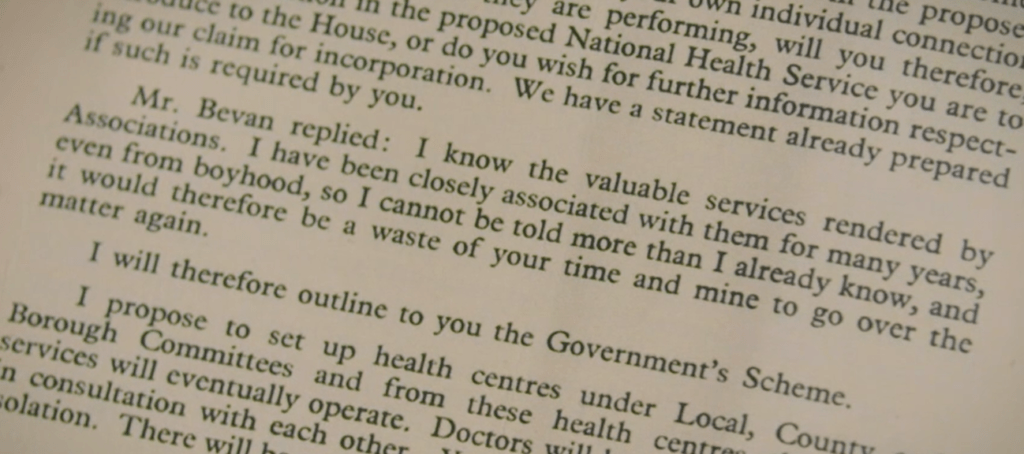By Andy Ford, NHS worker
The BBC programme Who Do You Think You Are, featuring the Welsh comedian Ruth Jones (from Fat Friends, Gavin and Stacey), brought out some interesting and little known aspects of Nye Bevan’s struggle to establish the NHS in the immediate post war period. In doing so, the programme also sheds light on the roots of its modern problems.
On her mother’s side, Ruth’s people were seafarers and ships’ captains, and it was all very interesting, but her paternal grandfather turned out to have been a lynchpin of the Medical Aid Societies across South Wales in the 1930s. These Societies, initially based on the miners’ unions, gradually expanded their remit and membership, until they were providing high quality healthcare across the industrial heartlands of the Welsh valleys.
In return for a small subscription, workers and their families got free access to general practice, hospitals and even specialist eye hospitals. Ruth’s grandfather, Henry Richard Jones, was secretary to the Neath Medical Aid Society, which ran a 320-bed hospital in Swansea, as well as clinics and doctor’s practices, and he later rose to be Secretary of the South Wales Federation of Medical Aid Societies, which had 38,000 subscribers.
As the family members of subscribers were also covered, this voluntary and worker-led organisation was offering medical cover to over 100,000 people by the outbreak of the Second World War. The Medical Aid Societies were democratic bodies, with policy set by elected delegates and they engaged health workers, including doctors, as their employees under their control. It was working-class self-organisation and democracy in action at its best.
What the programme explained, though, was that after the War, when Aneurin Bevan was Health Minister, he kept the societies at arm’s length, as he had to negotiate nationally with the doctors’ leaders. The programme showed Ruth’s grandfather writing to Bevan, mandated by the South Wales Federation, urgently requesting their involvement in designing the NHS, but to little avail.
They finally met Nye Bevan in 1946
When they finally met Bevan, in January 1946, his stance was that “it would be a waste of my time and your time to go over all this again”. Clearly, he did not want to upset to his planned compromise with the extremely well-to-do and powerful leaders of the British Medical establishment of the time. He cleverly covered up by saying “he was not emotional about particular institutions, just people”.

But, by giving in to the blackmail of the doctors’ leaders – he later said he overcame their opposition to the NHS by “stuffing their mouths with gold” – Bevan baked major faults into the NHS which affect it to the present day. Where the Medical Aid Societies were led by working class people, the leadership of the NHS was effectively handed over to the consultants. Where the Medical Aid societies were democratic, the NHS has always been paternalistic and hierarchical.
Whereas in the Medical Aid Societies, doctors and dentists were working employees – albeit very skilled workers, but still employees – the NHS engaged them on a variety of terms from self-employment for GPs and dentists, to part time consultants who were then able to use NHS facilities for lucrative private practice. Only a minority of doctors, usually the most junior, were directly employed.
Bevan missed an opportunity to bring in the radical working-class approach to health developed in his own South Wales in his rush to neutralise opposition to the very idea of an NHS from the wealthy tops of the medical profession. It is arguable as to whether or not scandals like Shrewsbury maternity or Mid Staffs would have been possible in a democratic NHS. And would the recent furore over non-access to GPs be as likely if they were salaried employees?
Disgracefully, not only were the Medical Aid Societies excluded from the deliberations over the set up of the NHS, but their staff, like Ruth Jones’ grandfather, were excluded, not only from influence, but even from employment in the NHS. Ruth was shown a letter rejecting him from any management position in the newly formed NHS, even though he had put in decades of work, on a normal worker’s pay, in leading and organising health services across South Wales.
In summary, the programme gives powerful ideas for what socialists should be positively demanding for a modern NHS.
The episode of Who Do You Think You Are featuring Ruth Jones is still available on the BBC i-player, but only for a short time. It can be found here.



